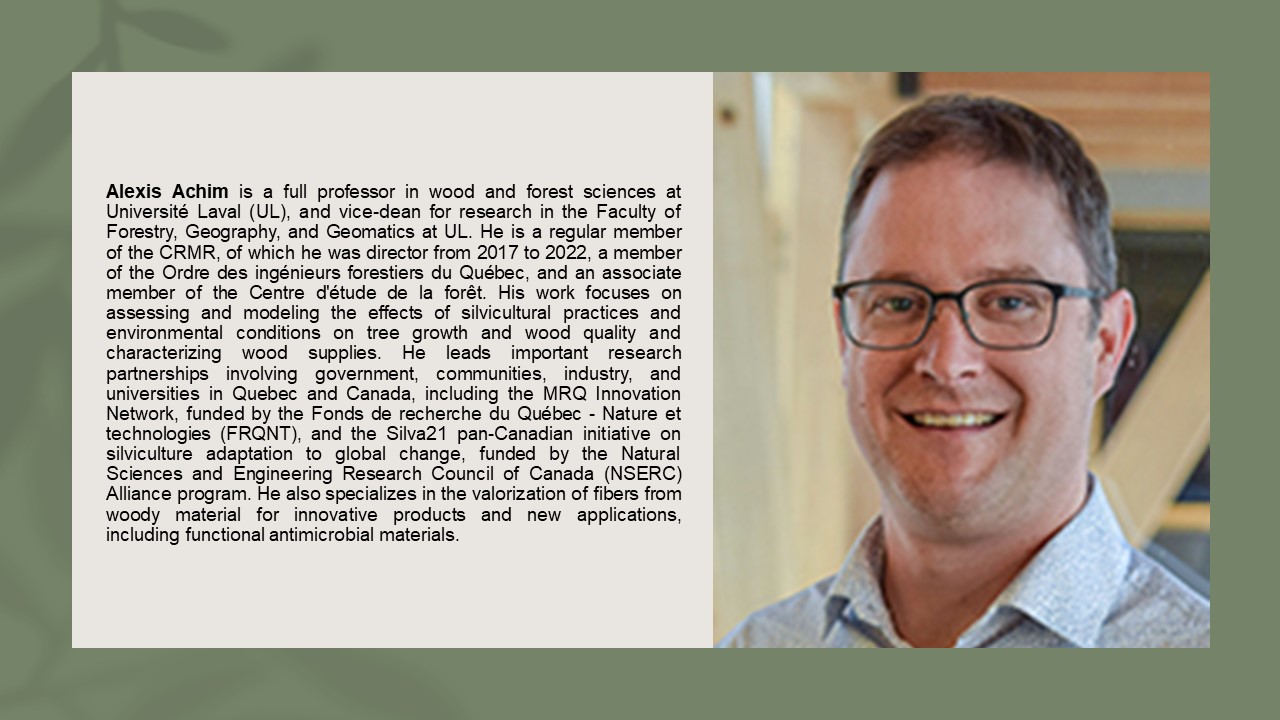Congratulations to Alexis Achim, the recipient of an NSERC Alliance Grant for a multidisciplinary project on the valorization of cellulose filaments!
Congratulations to Alexis Achim, Professor, and Vice-Dean of Research at the Faculty of Forestry, Geography and, Geomatics (FFGG) of Laval University, who has been awarded an NSERC Alliance Grant as principal investigator in a multidisciplinary project on the valorization of cellulose filaments!
This project will receive 746 788$ in funding over three years, 60% of which will come from public contributions (40% from NSERC and 20% from CRIBIQ) and 40% from the industrial partner Kruger Inc.

PROJECT DETAILS
Project title: Valuing cellulose filaments in innovative, sustainable, and renewable bioproducts
Objectives:
This large-scale project will support the development of cellulose filament-based applications for the agricultural,hygiene and health, construction, and environmental sectors. The development of three types of products is targeted by the project:
- Agricultural bioproducts;
- Antimicrobial papers;
- Concrete products.
These new products will then be compared with conventional products through life cycle assessments to evaluate their environmental performance.
Team
This project will rely on the participation of a multidisciplinary team:
Research team:
- Alexis Achim (principal researcher), CRMR, UL
- Tatjana Stevanovic, CRMR, UL
- Véronic Landry, CRMR, UL
- Alain Cloutier, CRMR, UL
- Benoît Bissonnette, CRIB, UL
- Nabil Amara, FSA, UL
- Julie Jean, FSAA, UL
- Annie Levasseur, ÉTS
Team of collaborators:
- Rémy Lambert, FSAA, UL
- Sébastien Lange, CCTT Biopterre
- Julien Bley, CCTT Innofibre
Financial partners :
- NSERC, Kruger, CRIBIQ (MEIE)
Recruitment of highly qualified personnel (HQP)
The project will also allow the recruitment of three master and doctoral students and three postdoctoral fellows.
Project Summary
Cellulose filament (CF) is a new biomaterial derived from an innovative process that is powered almost entirely by renewable energy and uses wood pulp without furter uses of chemicals and enzymes. CF is versatile and has the potential to increase the strength, durability, and functionality of many conventional products. This project aims to scientifically support the development of applications for CF in a range of products with high technical and environmental properties. The overall project comprises four themes: « agricultural bioproducts», «antimicrobial papers», «concrete products», and «environment», covering the agriculture, hygiene and health, construction, and environmental sectors.
Due to its potential to replace non-renewable products, CF could be used to develop innovative agricultural bioproducts such as microgreen substrates, biostimulants, biodegradable pots, and mulch films. However, despite their technical performance, the integration of these products into the market is hampered by the reluctance of producers and consumers to change. Thus, in the “agricultural bioproducts” theme, the project proposes to study the perception of consumers and producers in the agricultural sector towards CF-based bioproducts. A key element of this project will be to evaluate whether a better environmental performance of these products will modify the perception of the actors. The results should help managers in their decision-making to facilitate the development of a strategic marketing plan for these new products.
CF can also improve the antimicrobial functionality of several types of tissue used in health and hygiene products, including biodegradable masks. The high specific surface area of CF is expected to increase the retention of antibacterial and antiviral agents and provide improved antimicrobial action for the papers. For masks, cellulose is one of the most promising materials that can be used to replace petroleum-based synthetic fibers. Cellulose is abundant, biodegradable, inexpensive, and easy to process. In addition, it can provide masks with the desired properties of filtration efficiency against harmful particles and air permeability to facilitate breathing through the mask’s multilayers. The antimicrobial technologies developed in this project should also provide effective and affordable solutions for a range of paper products from project partner Kruger. Thus, under the «antimicrobial papers» research axis, the project proposes to evaluate different methods of grafting antimicrobial agents to CF and to develop tissue papers with antibacterial and/or antiviral properties.
In the construction sector, CF can help meet the sustainability and resilience requirements of infrastructure systems. For example, when incorporated into cement-based engineered products, they offer improved durability and superior mechanical performance. Concrete is by far the most widely used construction material in the world. By adding CF, its durability is increased. These innovative products, therefore, contribute to reducing the high carbon footprint of the cement industry and construction activities as a whole. In the « concrete product » theme , the project proposes to study the effect of adding CF to concrete on its strength and dimensional stability for a variety of applications, including vertical elements and conventional floors.
Finally, in the « environment » theme, the project proposes to identify opportunities to improve the life cycle and environmental performance of all CF based products. We will compare CF-based products with conventional materials in order to identify the main environmental advantages and disadvantages. This will enable the development of cost-effective and competitive solutions that are more environmentally friendly.
Overall, the research results will help adapt pulp and paper and CF manufacturing processes while promoting cleaner technologies for the future and Canada’s economic growth.

